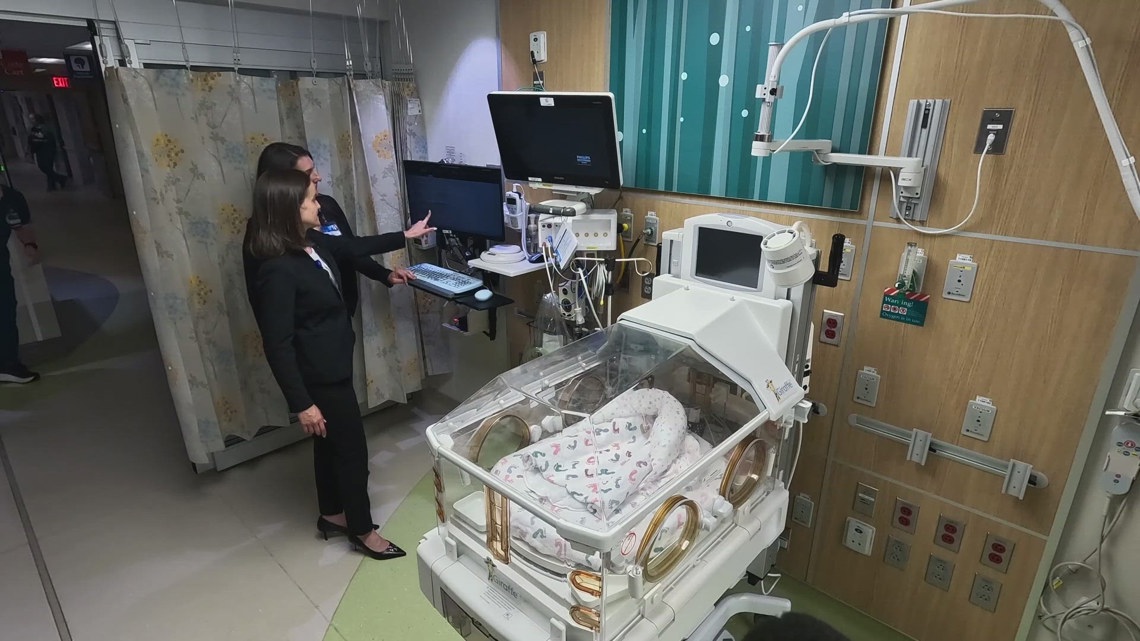
AI develops personalized treatment for ultra-rare genetic condition: HealthLink
作者:Author: Christine Pae (KING 5)
A Minneapolis family shares their story to raise awareness on the groundbreaking treatment that has helped their daughter.
SEATTLE — Artificial intelligence is helping tackle the overwhelming task of treating what's known as "ultra-rare" genetic conditions, many of which lack a cure.
Two-year-old Jorie Kraus has such a condition, known as DeSanto-Shinawi syndrome, a rare genetic disease that affects only dozens of estimated cases worldwide.
Jorie's parents, Dave and Joanie Kraus, are sharing their story to bring awareness to a potential treatment.
"I just don't think we would be able to live with ourselves if we have this information, couldn't share it with other people," said father Dave, who splits his time between Twin Cities, Minnesota, and Bellevue, Washington, where he works for Amazon.
Doctors at the Mayo Clinic have harnessed the power of AI to develop a personalized treatment for Jorie, calling it a breakthrough.
DeSanto-Shinawi syndrome is caused by a missing piece of chromosome 10. It affects heart development and causes severe neurodevelopmental delays. Her parents learned of the diagnosis after Jorie's birth, despite genetic testing after Jorie was conceived via IVF.
"When you think you get the testing, you think, oh, I'm gonna have a healthy baby, and they don't realize that that testing only takes care of a small fraction of really what could be when it comes to especially rare diseases or Jorie's case, ultra rare diseases," said Joanie.
Unlike other medical challenges the family had faced, this condition presented unique difficulties.
"Everything else had a surgery that she was dealing with. And when it came to this, there was, there was no fix," Dave said.
AI-Driven Drug Discovery
The breakthrough came when the Krauses connected with Mayo Clinic doctors Laura Lambert and Whitney Thompson, who utilized the clinic's "BabyFORce" program. The team turned to AI to search through thousands of FDA-approved medications, looking for something that could help Jorie produce more of an important protein that she was missing.
The AI identified a commonly-used pediatric neurologic medication that could "upregulate" Jorie's remaining functional gene, essentially boosting production of the protein her body desperately needed.
"It's very unlikely that we would have seen it without the AI tool," said Dr. Lambert.
Before administering the medication to Jorie, the medical team took an additional precautionary step by testing it on her cells in a laboratory to prove it would work.
"What is unique about what we're doing is that we are taking the patient's own cells and taking that extra step of testing the drug in their cells to see if it works before we recommend that it be prescribed to the patient," Dr. Lambert said.
"Remarkable Results"
Since starting treatment in April, Jorie has shown unprecedented progress. She has gained new skills, including walking with a walker for the first time and saying her first words. Blood tests confirmed that her protein levels have normalized, and a recent MRI showed improvements in her brain.
"We've been blown away by how well she's done since starting treatment. So she only started the medication in early April, and even within weeks of starting the medication, we were hearing from her parents that she was gaining new skills," Thompson said.
Future Applications
The Mayo Clinic team is now working toward clinical trials to help other children with the same condition and exploring how this AI-driven approach could be applied to other rare genetic diseases.
"It gives us a lot of hope too that, you know, not only for this condition, but for other rare genetic conditions, this is a potential approach that could work," Dr. Thompson said.
Family's Mission
This breakthrough represents a significant advancement in personalized medicine for ultra-rare genetic diseases, potentially opening new pathways for treatment where none previously existed.
The Kraus family, motivated by their experience, started a nonprofit called The Jorie Effect to raise funds for this specialized therapy and continue raising hope for Jorie and others facing similar challenges.
The family's perspective on their journey reflects the reality many families with medically complex children face.
"Anybody that has a child that's medically complex, I think that's the first thing they'll say is that we don't take anything for granted," Joanie Kraus said.
